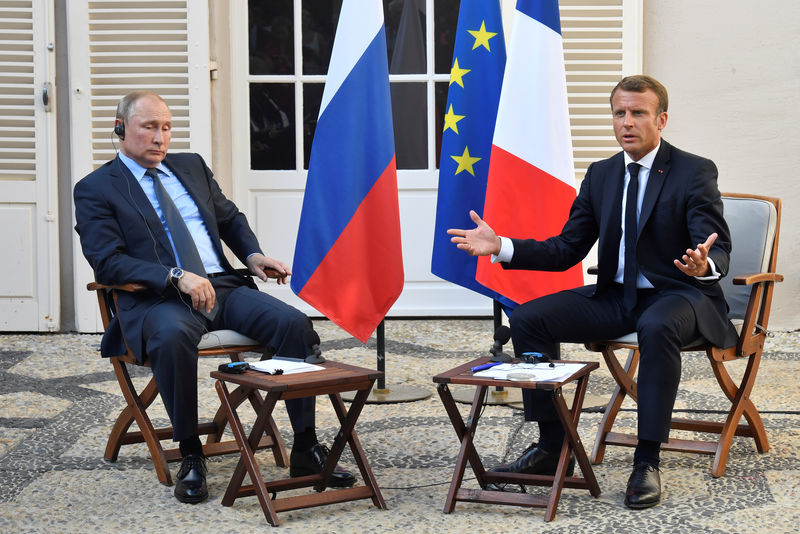By Robin Emmott, John Irish and Andreas Rinke
BRUSSELS (Reuters) - French and German attempts to end the conflict in east Ukraine risk increasing tensions that were already rising in the European Union over how to handle Russia and which could complicate peace efforts.
Progress at talks between Russian and Ukrainian envoys have raised hopes of convening the first international summit in three years on ending the fighting between pro-Russian separatists and Ukrainian government forces.
But some EU states, while welcoming a summit that would involve France, Germany, Ukraine and Russia, are worried by growing talk that the EU might partially lift sanctions imposed on Moscow since its seizure of Crimea from Ukraine in 2014.
EU divisions over how to deal with Moscow have been growing over overtures to the Kremlin in recent months, led by Paris.
Comments by French President Emmanuel Macron have especially upset governments in EU countries that were once Soviet satellite states or constituent republics. Alarmed by what they see as an increasingly aggressive Russian foreign policy, they reject anything that might smack of appeasement.
"Are we to reward Russia because they have not done anything grotesque in the past few months?" one EU diplomat asked.
In EU meetings, letters and speeches, divisions about Russia that were once under control are resurfacing, diplomats say.
The tension could make it harder for the EU to agree new sanctions if Russia intensifies what are often depicted by Western leaders as efforts by President Vladimir Putin to undermine Western institutions such as the 28-nation bloc.
The tension could also further divide the bloc - with a group of French-led, relatively Russia-friendly allies such as Italy on one side, and the Baltic states, Poland and Romania on the other. This in turn could weaken the resolve of Western-backed governments to stand up for Ukraine, diplomats said.
EU diplomats still expect leaders of the bloc to extend sanctions on Russia's energy, financial and defence sectors for another six months at a regular summit in December.
But while Macron and German Chancellor Angela Merkel say there can be no sanctions relief until Russia implements a peace deal for Ukraine agreed in 2014-2015, both see sanctions as impeding better relations with Moscow.
MACRON'S "RESET"
The measures, imposed over the annexation of Crimea and Russian support for the separatists fighting in Ukraine, require all EU governments to agree. Any friction could allow just one country, possibly Moscow's ally Hungary, to end them.
"The time has come for the German government to pressure the EU for a partial lifting of the sanctions," German lawmaker Peter Ramsauer, whose centre-right Christian Social Union (CSU) is a member of Germany's ruling coalition, told Reuters.
Baltic states, once part of the Soviet Union, fear a Russian trap to block Ukraine's ambition to join NATO and the EU. The country of 42 million has borders both with Russia and countries in the EU and NATO.
With Germany open to France taking a more active role on Russia, Macron unexpectedly relaunched a bid for better Russian ties in July.
Sending his defence and foreign ministers to Moscow in September and ending a four-year freeze on such high-level diplomatic visits, Macron is seeking to bring Moscow back into the fold of leading industrialised nations.
Macron, who said in August that alienating Russia was "a profound strategic mistake", wants Moscow's help to solve the world's most intractable crises, from Syria to North Korea.
"The geography, history and culture of Russia are fundamentally European," Macron said on Tuesday in a speech to the Council of Europe, the continent's main human rights forum, from which Russia was suspended after Crimea.
Russia's readmission in July, for which France and Germany lobbied, was the first time that an international sanction imposed for Moscow's seizure of Crimea has been reversed.
Charles Michel, Belgium's prime minister, told EU diplomats last month that while Russia was a security threat, it "remains a neighbour too and we must deal with this reality."
In a letter to EU diplomats last month, the EU's ambassador to Moscow also called for a "pragmatic" approach to Russia.
REWARD OR REVENGE?
EU diplomats from eastern, Baltic and Nordic nations have said they are confused by Macron's approach, questioning what has changed in Russia to merit a renaissance in relations.
The conflict in east Ukraine has killed over 13,000 people since April 2014 .
Russia and Ukraine swapped prisoners in September in what was seen as the first sign of an improvement in relations. But Putin has ruled out returning Crimea, gifted to Ukraine in 1954 by then Soviet leader Nikita Khrushchev.
NATO accuses Russia of trying to destabilise the West with new nuclear weapons, pulling out of arms control treaties, cyber attacks and covert action.
Last year, Western governments including France expelled an unprecedented number of Russian diplomats after a nerve agent attack on a former Russian spy in England that EU leaders blamed on Moscow. The Kremlin rejected any involvement.
Michel Duclos, a former French envoy to Syria, said the risk for Macron was that, viewed from Moscow, France was "useful for disuniting the Western camp," recalling what he said was a "classic feature" of East-West relations during the Cold War.
Macron's offer to Putin is based on setting up a so-called structured dialogue focusing on five points: sharing expertise and intelligence; a mechanism to defuse EU-Russia tensions; arms control in Europe; European values; working together on international crises.
The European Union's own five-point strategy to deal with Russia involves so-called selective engagement. Many EU diplomats say that is the best way forward, seeking Russian collaboration on issues such as climate change to rebuild trust.

(John Irish reported from Paris, Andreas Rinke reported from Berlin, Additional reporting by Ekaterina Golubkova in Moscow, Editing by Timothy Heritage)